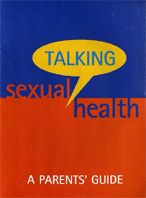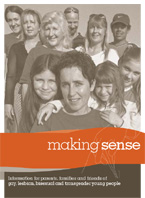This page provides information for parents about their child's sexuality education, advice on how to deal with sensitive issues, addresses the parents’ role in sexuality education and provides website links to resources for further reading.
Sexuality education
The term
sexuality education reflects the approach our schools take in covering the many areas of this topic, including focusing on love, abstinence, safer sex, respect for others and oneself, diversity, personal rights and responsibilities, relationships and friendships, effective communication, decision-making and risk behaviours.
The use of the word
sexuality in sexuality education is preferred to the traditional term
sex education which has become synonymous with education exclusively focussed on the biology of sex – ‘the birds and the bees’.
Sexuality education is an essential curriculum component of the Victorian Essential Learning Standards. Teachers assess student achievement against the learning standards within the Health and Physical Education domain.
A shared responsibility
The Department approaches the sexuality education of your child as a shared responsibility. That is, while it is compulsory for schools to deliver sexuality education within health and physical education, your child’s sexuality education is most effective when you are also actively involved.
Many parents have found when their child participates in school-based sexuality education, talking about sex-related issues increases between them and their child. Alternatively, many teachers have found children are more likely to participate fully in the program offered at school when the child is comfortable in talking about sex-related issues.
Your role in your child’s sexuality education
The important role you play in your child’s sexuality education includes:
- providing the family perspective
- supporting your child’s level of comfort in discussing sexuality-related issues
- maintaining an open dialogue with the school about the school-based sexuality education program
- responding positively and supportively to learning opportunities at home
- attending a school's parent information meeting.
Research tells us children who are well informed and comfortable in talking about sexuality with their parents are the least likely to have intercourse when they are adolescents. Lack of information poses greater risks (DiIorio, C, Resnicow, K et al, 2006; Hutchinson, K, 2002; Jemmott JB, Jemmott LS, 2000).
Parent information meetings
Attending an information meeting is a good opportunity to put across your point of view, hear other parents’ points of view, and directly hear from those who will be responsible for the school-based sexuality education program. An information evening can also provide an opportunity to discuss your role and the school’s role, and where you can support each other.
A school may hold a parent information meeting prior to your child’s sexuality education to discuss the proposed curriculum and materials. Contact your child’s school and find out the details for the sexuality education program and if the school intends to conduct a parent information meeting or provide advice in some other way.
If the school has chosen to involve a local community agency or expert provider, they will be present at the meeting.
A whole-school learning approach
The approach to sexuality education undertaken by Victorian government schools is referred to as a whole-school learning approach. This involves the provision of comprehensive sexuality education present in the classroom learning, in the policies and practices of the school, and in the partnerships the school develops with the local community and yourself.
This approach has been developed through an extensive literature review and a program evaluation conducted by the Australian Research Centre in Sex, Health and Society, La Trobe University. This school program evaluation involved over 50 Victorian primary, secondary and special schools, including Catholic and independent schools.
The Department believes that the whole-school learning approach to sexuality education has the greatest potential for maximum learning outcomes for your child, equipping them for a healthy and fulfilling adult life.
For more information, see:

Talking sexual health – parents’ guide
The Australian Government provides a booklet containing sexual health information to help you feel more informed and confident when talking to your child about sex. See:
Children with intellectual disabilities
All children, with or without a disability, need ongoing and age appropriate sexuality education. For useful tips, see:
The Victorian Better Health Channel
This Victorian Government website provides simple tips and a range of practical suggestions to help in communication with your child about sex.
Parent groups
Parenting Research Centre
The Parenting Research Centre engages in a range of research activities to help parents raise children well. See:
Parenting Research Centre
This research centre also supports a number of programs, including the ABCD Parenting Young Adolescents program.
Victorian Parents Council
The Victorian Parents Council represents parents of schoolchildren attending non-government schools.
Sexual diversity

The Department recognises that sexuality education is only effective for all students when it acknowledges and caters for student sexual diversity.
You are likely to experience a range of emotions if your child tells you they think they may be gay, lesbian, bisexual or transgender. The following resources may help you through this experience.
-
 SSAFE – Making Sense (pdf - 445.7kb) - This booklet aims to answer some of your questions and to help you make sense of some concepts and issues you may be unfamiliar or uncomfortable with. It was produced by the SSAFE (Same Sex Attracted Friendly Environments) in Schools Project, Family Planning Victoria and funded by the Victorian Premier’s Drug Prevention Council and VicHealth.
SSAFE – Making Sense (pdf - 445.7kb) - This booklet aims to answer some of your questions and to help you make sense of some concepts and issues you may be unfamiliar or uncomfortable with. It was produced by the SSAFE (Same Sex Attracted Friendly Environments) in Schools Project, Family Planning Victoria and funded by the Victorian Premier’s Drug Prevention Council and VicHealth. -
 Kaleidoscope - Drug prevention, family support for same-sex attracted young people (pdf - 78.98kb) - This fact sheet looks at issues facing young people who are same-sex attracted, discussing some of the risk factors affecting their wellbeing, and offers suggestions on how you can support them. It has been reproduced from the DrugInfo Clearinghouse with permission from the Australian Drug Foundation (copyright, Australian Drug Foundation, 2003).
Kaleidoscope - Drug prevention, family support for same-sex attracted young people (pdf - 78.98kb) - This fact sheet looks at issues facing young people who are same-sex attracted, discussing some of the risk factors affecting their wellbeing, and offers suggestions on how you can support them. It has been reproduced from the DrugInfo Clearinghouse with permission from the Australian Drug Foundation (copyright, Australian Drug Foundation, 2003).
Children of gay and lesbian parents
Children often find it difficult to make themselves understood when describing their lesbian or gay parents and this can lead to anxiety and secrecy. Many parents find this of concern and want to assist their child through these issues.
For information on dealing with these issues, see:
 Kaleidoscope - Fostering resilience in children of lesbian and gay families (pdf - 82.95kb) - This fact sheet has been reproduced from the DrugInfo Clearinghouse with permission from the Australian Drug Foundation (copyright, Australian Drug Foundation, 2003).
Kaleidoscope - Fostering resilience in children of lesbian and gay families (pdf - 82.95kb) - This fact sheet has been reproduced from the DrugInfo Clearinghouse with permission from the Australian Drug Foundation (copyright, Australian Drug Foundation, 2003).
‘School experiences of the children of lesbian and gay parents’ - An article by Vivien Ray and Robin Gregory (Family Matters, no.59, Winter 2001).
Recommended websites
Australian
International